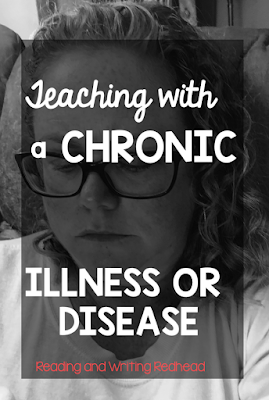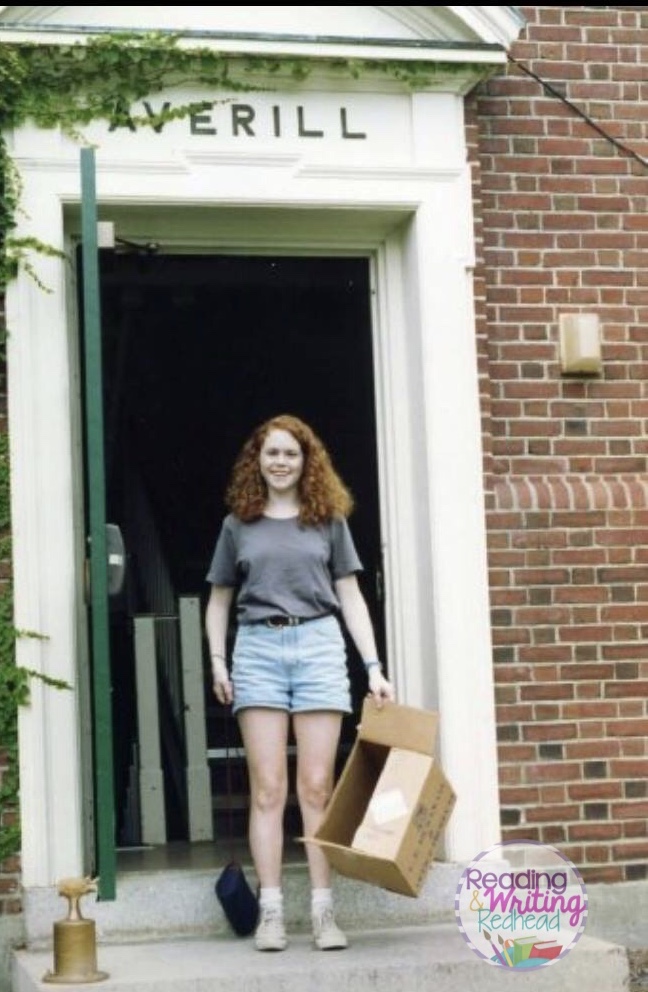I have considered writing this blog post for a few years and recently decided it was time to share. As most of you know, I have been teaching second grade for twenty years and I also am a certified reading specialist. What most of you don’t know is that when I was three years old, I was diagnosed with Juvenile Rheumatoid Arthritis. I am going to share this story with you in two parts: first, a short (hopefully) telling of my story and then secondly, what it’s like to teach with a chronic disease like this. After all, I am not alone.
You won’t find a ton of advice here – though I might share a tip here and there. This post is opening up the window to what is like to teach when you’re in this situation. At the end of the post, I will share some helpful links with you if you would like suggestions.

So, the history… at age two, I was complaining that “my legs hurt”. After my knees swelled up (my mom said they looked like apples) I believe my parents took me to a few doctors and that’s when they got the unexpected diagnosis. It was a scary time for my parents with a lot of worry and fear because they didn’t know what to expect. They took me to the wonderful Children’s Hospital in Boston. So thankful for the doctors and staff there because I continued to be treated there into my college years – close to two decades.

I got braces for my legs and had to wear them for several years with clunky shoes. It’s hard to tell but I am wearing my tights over them in this picture. At the time when I was diagnosed, in 1977, the only treatment for children was baby aspirin, or Bayer. I had to take several aspirin every few hours. I had a physical therapy mat and exercises.

Several years later, (note the 80’s style) my knees and ankles had improved and the braces were gone. The arthritis was now affecting my wrists and fingers. I don’t recall being limited as far as what I could do because of it but the BIG problem became my stomach. Probably due to five+ years of taking baby aspirin every day, I was having huge stomach pains. They would come and go but were very painful. I have flashbacks to being doubled over in pain in the local supermarket and being up in the middle of night with pain. I spent a good amount of time in the school nurse’s office due to these stomach aches.
Luckily, not too long after this, in the mid- 1980s, new medications were approved for use with JRA (Juvenile Rheumatoid Arthritis) patients. The first: plaquenil. The problem: I couldn’t swallow pills. I never learned and it scared me. The solution: smash the pill up and put it with a spoonful of jelly. The result: disgusting, horrible, bitter tasting crap.
I went on to several NSAIDs and other medication such as prednisone. I also suffered through years (I think almost ten) of “gold” shots. Yes, shots that contained “gold”. It’s a substance that is very thick and requires a large needle and takes a long time to inject.

Here I am in college! Still getting the gold shots, but on some very effective medication and doing well. Between these time periods, however, I lost flexibility and mobility in my right wrist and was unable to do some activities such as lifting heavy things (Obviously an empty box as seen here was ok) and things like playing volleyball or other sports requiring the hands or wrists.

Right after college I started a medication called Methotrexate. It was effective and I remained on it for most of my twenties. I was able to travel, have fun, and begin my teaching career. I still had issues with my hands and wrists however, and that has never gone away. My current medication is an injectable and I have been injecting myself once or twice a week for more than a decade. I am happy that I have been able to stop all others meds except for occasional use!
So what challenges great me as I start the school year? I imagine many of us have the same challenges but we with illnesses and diseases have some of the challenges I outline below.

I am tired. Very tired. Everyone is tired but those who are battling illnesses, diseases, or chronic conditions on a daily basis are really tired. I can’t recall a time when I was not tired, back to when I was about ten years old. When a body is fighting something serious, it takes energy and you feel it. I joke that I have a “sleeping sickness” but really it’s the extreme fatigue. Plus, medications for illnesses often have that side effect of you guessed it, fatigue. We are exhausted. We press snooze multiple times. We struggle to stay alert when driving to and from school (my personal secret weapon is chocolate covered expresso beans). We fall asleep on the couch after school and don’t get anything done. Then because we napped, we can’t fall asleep. So if you have colleagues dealing with this, please keep in mind we are S T R U G G L I N G with energy and alertness.

For folks dealing with illness and disease, daily tasks at school can be challenging. Just a few that can be tough for me are writing on the board, writing neatly on papers, activities that require fine motor precision (drawing straight lines without a ruler, cutting small items and carrying items that are heavy and put pressure on my wrist. We also might struggle with using a key to lock and unlock doors, not being able to use the bathroom for hours at a time, climbing stairs, not being able to be restraint trained, bringing items to and from the car and standing or walking around for long periods of time.

If you’re dealing with an illness, disease or chronic condition, you may have to put pride and independence aside and ask for support. We may ask for extra bathroom breaks (or even just one), we may not be able to do a recess duty or lunch duty, we may not be able to move items ourself and need to ask the custodian or a friend for help, or we may have to advocate and say that we simply cannot restrain a child. Maybe we have to take more days off than allocated, ask to work a shorter week or day, or take a medical leave. We may have to ask for a classroom on the first floor or for elevator improvements. It can be psychologically tough to speak up and ask for help. Personally, know if I ask someone for help or an accommodation, it is truly needed and I am sure most teachers are similar in this regard.

Some of us have illnesses that you don’t know about. Maybe we only told our principal or boss or a few close friends and word did not spread. Or you heard once ten years ago but forgot because it doesn’t “look like” we are sick. I had to speak to a new administrator a few months ago because I realized since she was new, she did not know. She was quite surprised because again I don’t “look sick”. Autoimmune disease and other illness don’t always have obvious physical markers so keep in mind we may look okay but there is a lot going on beneath the surface,

Sometimes, there are not enough leave days. Or we have to take every single one. Two years in a row, two different parents called the principal, asked how many days I had taken, and complained that it was too many (even though I had taken less than the fifteen allotted days). Doctor’s appointments have to be during the school day, or we might have to leave early or take a half day to get there on time. We may miss PD time because of them. Sometimes we’re just struggling and even though we don’t have a fever or cough, it’s our illness and we need to get your energy back and take as day. We all hate to be out as teachers, but when you see colleagues who DO use those leave days, don’t judge or silently criticize. We may have no or very little choice. And I thank goodness every day for the leave days I do have to use!
Being a teacher is so challenging! And I honestly feel it’s extra challenging for those who are dealing with these issues. I felt like it was time to share my own story and thoughts and maybe we can support each other and others as we go through this teacher life!
So what are your experiences like with these struggles? Have you or your loved ones gone through these types of challenges at school?
If you’d like to comment about your own personal experience, please do so. I’d love to support each other. Or feel free to privately email me and we can connect that way.

I mentioned some resources that might help at the bottom. I found a few other helpful blog post and even a podcast. They give some great advice and tips!
The Cullom Corner: Strategies for Teaching with a Chronic Illness
Angela Watson’s Truth For Teachers Podcast: 4 Ways Teachers with Chronic Pain or Illness can Maximize their Productivity
EdWords: What Teachers with Chronic Illnesses Wish our Principals Knew
Music Teacher’s Helper Blog: Teaching with a Chronic Illness




